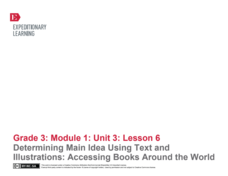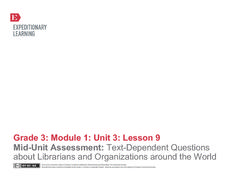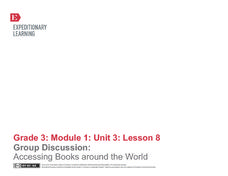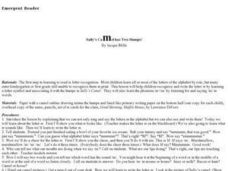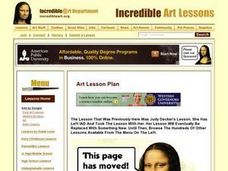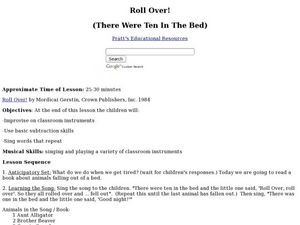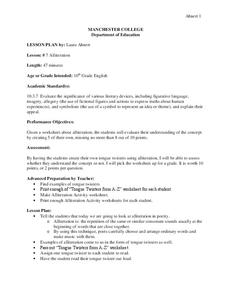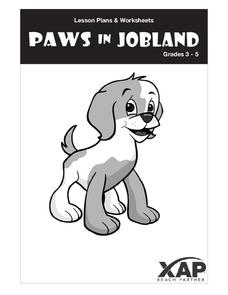Global Oneness Project
Exploring Cultural Sustainability
Small groups learn about a present-day nomadic culture in Mongolia and the threats to its existence by exploring a photo essay. The resource includes thoughtful discussion and writing prompts about cultural sustainability, the...
Baylor College
We Need Water
There's nothing quite like a glass of ice-cold, freshly squeezed lemonade. Lesson seven of this series explains how the water humans need to survive can come in many forms. Teach your class about how much water humans require every day...
EngageNY
On-Demand End of Unit Assessment and Bookmark Celebration
Using everything they have learned about writing paragraphs over the past few lessons of the unit, class members compose an informative paragraph independently. This is an authentic assessment of their ability, since learners have...
Federal Reserve Bank
The Fed - Helping Keep Banks Safe and Sound
What does an examiner look for when analyzing a bank's financial condition? In addition to learning about the 5-Cs for reviewing loans and CAMELS (capital, assets, management, earnings, liquidity, and sensitivity to risk), your learners...
Curated OER
Talking Rocks
Artists imitate the symbols used by tribes of the Southwest or use their own word pictures that communicate something about themselves. This instructional activity is a perfect blend of visual art and social studies. Students create a...
EngageNY
Determining Main Idea Using Text and Illustrations: Accessing Books Around the World
Ease into informational text with the instructional activity suggested here. Part of a unit series, the instructional activity draws from previous lessons and acts as a natural moment to add in informational text. Class members read one...
Curated OER
Playing Hot and Cold
Students read about homeothermy. Through research and poster projects, they gain insight into the diversity among mammals and the ways specific mammals survive in their native climates.
EngageNY
Close Reading of Excerpts from My Librarian Is a Camel: How Do People Access Books Around the World?
Acquaint your class with informational text through a close reading. First, examine a couple of pages together, looking at text features and content. The whole class focuses on marking down a brief summary of each paragraph before...
EngageNY
Mid-Unit Assessment: Answering Text-Dependent Questions About Librarians and Organizations Around the World
This is a skills-based assessment that asks test takers to use textual evidence to determine the main idea of an excerpt from an informational text as well as respond to text-dependent questions. The assessment is the middle point...
Curated OER
Science Talk about Mammals and Reptiles/Amphibians
Third graders use the internet to research mammals, reptiles and amphibians. They list important items about their chosen animal. Students identify characteristics of an animal and where they live. They classify animals as a mammal,...
EngageNY
Group Discussion: Accessing Books Around the World
Continue work with an informational text by following the procedures detailed here. The plan, part of a series, focuses on My Librarian is a Camel. Class members complete text-dependent questions and then prepare for and participate in a...
EngageNY
Talking with My Peers: Carousel of Reading Superheroes Around the World
In many places in the world, people go to great lengths to get books to read. This beginning-of-the-year activity uses pictures of people reading in extraordinary situations to stimulate effective listening and speaking using the...
Curated OER
Sally's Camel Has Two Humps!
First graders observe what the letter "m" looks like as it is written. They pretend to make the sound they make after eating a bowl of their favorite ice cream saying, "mmmmm" and do a cheer for the letter "m". They then look at a...
Curated OER
Watercolor Collage
Sixth graders study about Impressionism and Post Impressionism. They create a watercolor collage.
Curated OER
The Day of Ahmed's Secret
Students create a postcard showing and telling something they have learned about Cairo, Egypt.
Curated OER
The Day of Ahmed's Secret
Students create a postcard showing something they have learned about Cairo, Egypt.
Curated OER
Pleistocene Mammals
Students research the causes of the extinction of Pleistocene mammals. In this Pleistocene mammals lesson, students read essays to understand the Pleistocene epoch. Students write an essay about the personal impact of this...
Curated OER
Prehistoric Discoveries
Students agree or disagree with several statements about ancient animals, then read a news article about recent prehistoric discoveries. For this earth science and current events lesson, the teacher introduces the article with a...
Curated OER
How The Brahman Bull Got Its Hump
Learners examine ancestors of Brahaman cattle. After reading a story, "How The Camel Got His Hump," students discuss the differences between a camel and a Brahman bull. Upon completing a discussion of how the Brahman got its hump,...
Curated OER
Read a Transportation Story
Eighth graders research the career of Arctic transportation. In this arctic transportation instructional activity, 8th graders read a book about Arctic truck travel and review the historical aspects of transporting goods in the Arctic....
Curated OER
Roll Over! (There Were Ten In The Bed)
Students practice math, language, and music skills. For this interdisciplinary lesson, students learn the song "Roll Over!" practicing repeating word patterns and subtraction skills. Students improvise in the song by adding...
Curated OER
Alliteration
Help middle schoolers learnd about literary special effects using alliteration. They will review the definition for alliteration and complete several pages of activities that help them learn to identify and use alliteration. The word...
Curated OER
Extraordinary Explorers
Students, using the Internet, B41460research facts about explorers and travelers. They also state what places they have explored and share with the class.
Curated OER
Paws in Jobland
Students explore jobs in different countries . In this lesson about different countries through research. Students are broken into groups and given a country to research. Each group is provided with a worksheet with 14 questions to be...







